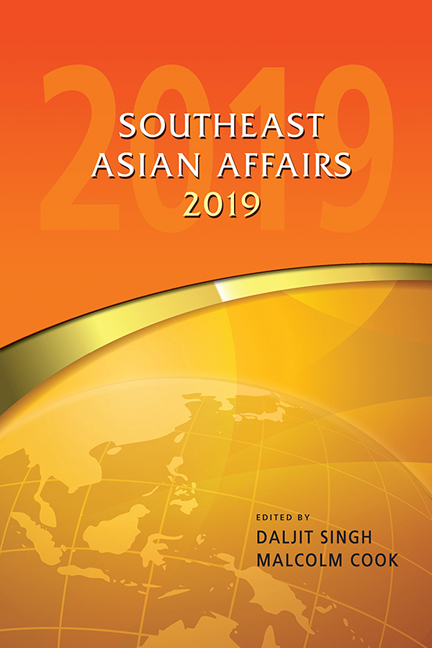Book contents
- Frontmatter
- Contents
- Introduction
- THE REGION
- BRUNEI DARUSSALAM
- CAMBODIA
- INDONESIA
- LAOS
- MALAYSIA
- MYANMAR
- THE PHILIPPINES
- Toxic Democracy? The Philippines in 2018
- The Rise of China, New Immigrants and Changing Policies on Chinese Overseas: Impact on the Philippines
- SINGAPORE
- THAILAND
- TIMOR-LESTE
- VIETNAM
Toxic Democracy? The Philippines in 2018
from THE PHILIPPINES
Published online by Cambridge University Press: 07 September 2019
- Frontmatter
- Contents
- Introduction
- THE REGION
- BRUNEI DARUSSALAM
- CAMBODIA
- INDONESIA
- LAOS
- MALAYSIA
- MYANMAR
- THE PHILIPPINES
- Toxic Democracy? The Philippines in 2018
- The Rise of China, New Immigrants and Changing Policies on Chinese Overseas: Impact on the Philippines
- SINGAPORE
- THAILAND
- TIMOR-LESTE
- VIETNAM
Summary
Toxic is the Oxford English Dictionary's word of the year for 2018. It is a word that captures the mood of our time, evidenced by the 45 per cent spike in frequency of people who looked up the term. Used in tandem with the word masculinity, toxic has served as descriptor to emphasize the physical harm, emotional damage and lethal effects of patriarchal power.
The same word can summarize the year 2018 for the Philippines. Beyond President Rodrigo Duterte's overt displays of toxic masculinity is a discernible pattern of his administration's aggressive attacks against the integrity of democratic institutions. From attempting to jail opposition figures to forging controversial deals with China that place the Philippines’ sovereignty at risk, the regime has demonstrated the extent to which it is willing to breach the boundaries of state power while evading accountability.
This chapter analyses the Philippines in 2018 around the three themes of toxic politics, toxic policies and toxic deals. Each of these themes focuses on specific issues that will draw attention to broader patterns of Duterte's rule, which, as this chapter argues, has assumed a toxic quality for democratic life. Toxic politics focuses on issues of press freedom and the ouster of the Supreme Court chief justice Maria Lourdes Sereno. Toxic policies examines how Duterte's iron-fisted approach to governance shaped the conduct of the Boracay island shutdown and Marawi rehabilitation. Finally, toxic deals focuses on Chinese investment and new tax laws.
By identifying these issues, this chapter does not intend to portray a bleak future for Philippine democracy. The final part of the chapter demonstrates how the public has responded to this political trajectory, and prompts reflection on where the nation may be headed.
Democracy's Autoimmune Disease
There has always been a danger that the populist President Duterte would have a toxic effect on Philippine democracy. Populism, as political theorist Simon Tormey puts it, is a pharmakon, “a powerful substance intended to make someone better, but which might end up killing him or her”. There is no way to know the outcome in advance, he argues, for the toxicity of populism “depends on the dosage and receptivity of the body”.
- Type
- Chapter
- Information
- Southeast Asian Affairs 2019 , pp. 261 - 274Publisher: ISEAS–Yusof Ishak InstitutePrint publication year: 2019

